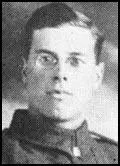William Brooks

William Brooks, the son of a seaman in the Merchant Navy, was born in London in 1898. After leaving school he worked at the Woolwich Aresnal where he was apprentices as an iron and steel moulder.
After coming under pressure from members of the Order of the White Feather, Brooks joined the British Army in 1915. A member of the Royal Engineers, Brooks was sent to France in January, 1917, to help build a broad-gauge railway.
Primary Sources
(1) William Brooks was interviewed about his experiences during the First World War in 1993. He explained why he joined the British Army in 1915.
Once war broke out the situation at home became awful, because people did not like to see men or lads of army age walking about in civilian clothing, or not in uniform of some sort, especially in a military town like Woolwich. Women were the worst. They would come up to you in the street and give you a white feather, or stick it in the lapel of your coat. A white feather is the sign of cowardice, so they meant you were a coward and that you should be in the army doing your bit for king and country.
It got so bad it wasn't safe to go out. So in 1915 at the age of seventeen I volunteered under the Lord Derby scheme. Now that was a thing where once you applied to join you were not called up at once, but were given a blue armband with a red crown to wear. This told people that you were waiting to be called up, and that kept you safe, or fairly safe, because if you were seen to be wearing it for too long the abuse in the street would soon start again.
(2) William Brooks joined the Royal Engineers during the First World War.
I was put in the Royal Army Service Corps and, would you believe, the horse transport section - and I never knew one end of a horse from another! Once they realised their mistake I was moved to the Royal Engineers. My wage was seventeen shillings per week, and there were women at the Aresnal earning four pounds per week working on munitions. Mind you, they had to work on eighty-hour seven-day week.
I was sent to France in January, 1917 to work on the broad-gauge railway. That was the railway system that took all manner of supplies, mainly ammunition and guns, also food, up to the front line, and sadly the same trains would bring back the dead. Hundreds and hundreds of them. It was very hard non-stop work maintaining the railway system, but it was essential to the war. I was mainly 'casting' - making everything from five-foot high wheels for steam trains to engine-blocks for trucks.
(3) While on leave from the Western Front William Brooks and his girlfriend witnessed a Zeppelin raid.
One night, we watched a Zeppelin raid on the Woolwich Aresnal. The German Zeppelin was sort of hovering over the building dropping bombs and they scored a couple of direct hits, causing massive explosions. We felt the blast two to three miles away. A few small bi-planes of ours went up to attack it but the Zeppelin had heavy machine-guns mounted in the cabin slung beneath it and, being almost stationary, could take careful aim on a plane. So our brave airman stood no chance. But one little plane went up, one of those double wing ones with all the struts holding the wings together. Well, this pilot flew above the Zeppelin and dropped bombs onto it. One hit it square on - flames started to light up the night sky. She was on fire all right. Everyone in the street started to cheer.
My dad was watching through a small telescope he had and said he could see the men on the Zeppelin inside the cabin rushing about throwing ropes over the side, and other things, trying to lighten the ship. Anyway, its main engines started up with a roar and she slowly began to move away with smoke pouring out of her. Well, dad said they knew they were done for, but were going to try and make it home. As it pulled away it looked like a huge wounded animal and going to die. It crashed in flames over Essex before it made the Channel. I know they were our enemies but I couldn't feel sorry for them. That was the last of the Zeppelin raid. They proved too vulnerable.
(4) In an interview in 1993, William Brooks argued that the arrival of the USA Army was vital in the Allied victory in 1918.
On my return to France the war was starting to go in our favour, mainly because the Americans had come in on our side. Mind you, the Yanks and the Aussies were disgusted at the way our officers treated us. There were cases where British officers tried to put Yanks or Aussie soldiers in front of a firing-squad but couldn't get away with it. If they had, I reckon those countries would have pulled out of the war and left us to it. There was a big riot about September 1917 by the Australians at a place called Etaples. They called it "collective indiscipline", what it was was mutiny. It went on for days. I think a couple of military police got killed. Field Marshall Haig would have shot the leaders but dared not of course because they were Aussies.
Haig's nickname was the butcher. He'd think nothing of sending thousands of men to certain death. The utter waste and disregard for human life and human suffering by the so-called educated classes who ran the country. What a wicked waste of life. I'd hate to be in their shoes when they face their Maker.

